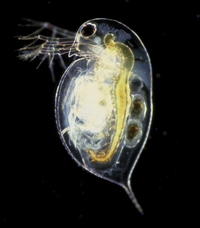
Photo from wikipedia
Resting eggs banks are unique windows that allow us to directly observe shifts in population genetics, and phenotypes over time as natural populations evolve. Though a variety of planktonic organisms… Click to show full abstract
Resting eggs banks are unique windows that allow us to directly observe shifts in population genetics, and phenotypes over time as natural populations evolve. Though a variety of planktonic organisms also produce resting stages, the keystone freshwater consumer, Daphnia, is a well‐known model for paleogenetics and resurrection ecology. Nevertheless, paleogenomic investigations are limited largely because resting eggs do not contain enough DNA for genomic sequencing. In fact, genomic studies even on extant populations include a laborious preparatory phase of batch culturing dozens of individuals to generate sufficient genomic DNA. Here, we furnish a protocol to generate whole genomes of single ephippial (resting) eggs and single daphniids. Whole genomes of single ephippial eggs and single adults were amplified using Qiagen REPLI‐g Single Cell kit reaction, followed by NEBNext Ultra DNA Library Prep Kit for library construction and Illumina sequencing. We compared the quality of the single‐egg and single‐individual amplified genomes to the standard batch genomic DNA extraction in the absence of genome amplification. At mean 20× depth, coverage was essentially identical for the amplified single individual relative to the unamplified batch extracted genome (>90% of the genome was covered and callable). Finally, while amplification resulted in the slight loss of heterozygosity for the amplified genomes, estimates were largely comparable and illustrate the utility and limitations of this approach in estimating population genetic parameters over long periods of time in natural populations of Daphnia and also other small species known to produce resting stages.
Journal Title: Molecular Ecology Resources
Year Published: 2018
Link to full text (if available)
Share on Social Media: Sign Up to like & get
recommendations!